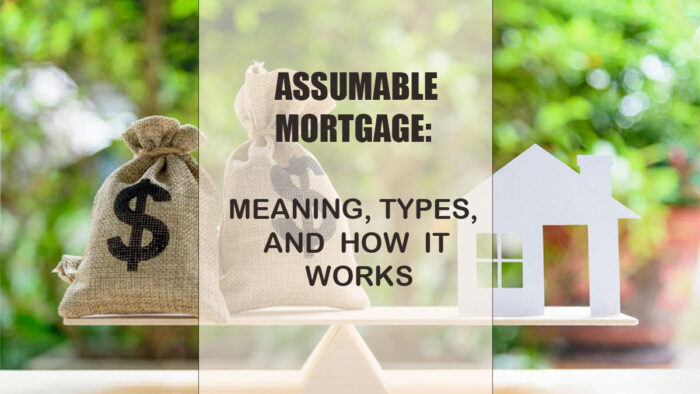Are you looking for a lender to apply for a brand-new mortgage when buying a house? If the house you want has an assumable mortgage, you can assume the existing loan, getting some benefit from the terms that are more beneficial than the ones you get in the current market.

A lot of current homeowners are still paying off the mortgages they got when rates were much lower than they are today. In this article, you will learn all that you need to know about assumable mortgages, including the types, the way they work, and a lot more.
What is an Assumable Mortgage?
An assumable mortgage is a home financing arrangement where a loan and its terms are transferred from the existing owner to the buyer. If you can assume the previous owner’s remaining debt, the buyer can take over the mortgage. They will then make payments on the residual balance at the same rate and term as the original borrower.
How Does An Assumable Mortgage Work?
An assumable mortgage is a home loan that can be transferred to a new borrower. A home seller transfers their current mortgage to the buyer of the mortgaged property, so the buyer does not have to apply for a new mortgage with an assumable mortgage.
You will take on the seller’s terms, with the remaining term length, the interest rate, the outstanding balance, and the mortgage servicer as the buyer. Your deposit for the house must make up the difference between the amount owed and the sale price.
What Types of Loans Are Assumable?
Some of the most common types of mortgages are assumable, and they are as follows:
• Federal Housing Authority
Federal Housing Authority loans are one of the types of assumable mortgages when both transacting parties meet the necessities for the assumption. Let’s say the property must be used by the seller as their primary residence. Let’s assume that you were the buyer. You need to verify that the Federal Housing Authority loan is assumable first. After that, you can apply as you would for an individual FHA loan.
The seller’s lender will confirm if you meet the qualifications, including being responsible. If accepted, then you will assume the mortgage. But note that, until the seller is free from the loan, they are still responsible for it.
• S. Department of Agriculture
The U.S. Department of Agriculture is also one of the types of assumable mortgages. The buyers of rural properties are the ones that can obtain them from the U.S. Department of Agriculture. They often have low interest rates and entail no down payment.
You must meet the standard qualifications to assume a USDA loan, like receiving approval from the USDA to transfer title and meeting credit and income requirements. You can assume the current loan terms or new rates, rates of interest, and terms. The mortgage cannot be assumed if the seller is delinquent on payments, even if you meet all the requirements and get approval.
• Veterans Affairs
Veterans Affairs is likewise another type of assumable mortgage. They provide mortgages to competent military members and spouses of military members. Nevertheless, you don’t need to be a member of the military to qualify to assume a VA loan. However, the lender and the regional VA loan office must approve you for the loan assumption, and most regularly, buyers who assume VA loans are military members.
If you are a buyer who is interested in assuming a mortgage from a seller, you must meet some precise requirements and get approval from the agency that is sponsoring the mortgage.
How Much Does it Cost to Assume a Mortgage?
The cost of assuming a mortgage depends on the amount of your deposit. You will have to pay the difference between what the home is worth and the amount the seller still owes. It might be a few thousand dollars or even tens of thousands of dollars.
You will likewise need to pay closing costs as you would with a regular mortgage (except for the appraisal fee). Closing costs typically range from 3% to 6% of the loan amount.
How to Qualify for an Assumable Mortgage
There are just a few things to do to be able to qualify for an assumable mortgage, and they are as follows:
- Study and know if it is acceptable to assume the loan.
- Choose if the assumption of the mortgage is a good idea.
- Find out about the costs.
- See if you can get the funds.
Assumable mortgages can be a good option for both buyers and sellers, but it is very important to understand the qualifications before you make any decision.
How to Assume a Mortgage
The lists below are tips that you can use to assume a mortgage, and they include:
- Demand an application from the lender.
- Accumulate all financial information.
- Ensure that you complete the application.
- Give responses to all follow-up questions and complete the forms.
- Make sure you sign an assumption agreement.
- Join the closing.
By following the above steps one after the other, you should be able to assume a mortgage.
FAQs
Is an Assumable Mortgage Good?
My answer is yes. When existing interest rates are higher than the present mortgage’s rates, an assumable loan may be the best option for you. Also, there are not many costs due at closing.
On the other hand, I will say no. If the seller has a large amount of equity in the home, the buyer will either secure a second mortgage or have to pay a large down payment for the balance not covered by the existing mortgage.
What Does Not Assumable Mean?
It obviously means that the buyer cannot assume the current mortgage from the seller. These types of mortgages are called conventional mortgages and are non-assumable. Some mortgages have non-assumable clauses, stopping buyers from assuming mortgages from the seller.
What is the Advantage of an Assumable Mortgage?
The primary advantage of an assumable mortgage is that the interest rate might be lower than the existing market rates for a new loan. In addition, assumable mortgage loans naturally have lower costs than new loans.
What Types of Mortgages Are Assumable?
Several types of mortgage loans are assumable. The most common ones are VA, FHA, and USDA loans.
How Do I Know If My Mortgage Is Assumable?
Some types of home loans are assumable. like USDA and FHA loans are assumable. Each agency has precise supplies that both parties must achieve for the loan to be assumed by the buyer. The USDA needs the house to be in a USDA-approved part, the seller must not be criminal on payments, and the buyer must meet some specific income and credit limits.



